Roots and Reason: The Why Behind the Music
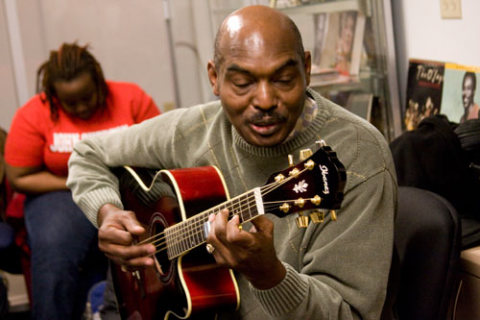
Ben Payton plays some Delta blues for professor Bill Banfield's course Africana Studies: The Sociology of Black Music in American Culture.
Photo by Jennifer Shanley
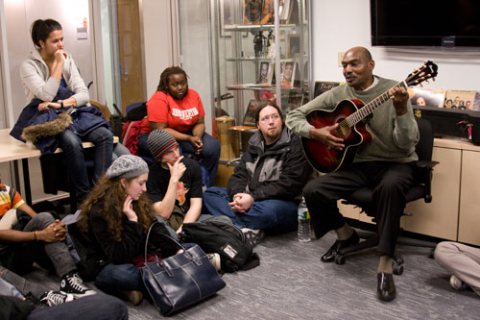
"A lot of people think blues are sad, but it they are the art of expressing sadness. They're about sad things, but you don't need to be sad to sing them," says Payton, who hails from Mississippi and who counts his grandmother's gospel piano and his uncle's blues guitar among his early influences.
Photo by Jennifer Shanley
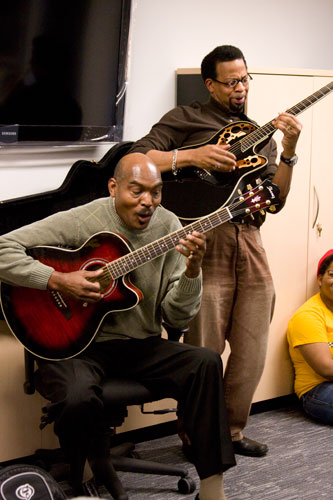
Banfield, professor and director of Africana Studies, jams with Payton.
Photo by Jennifer Shanley
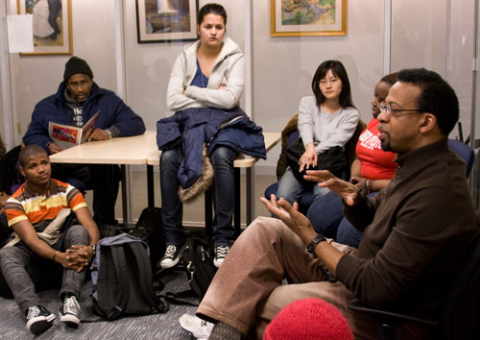
Banfield talks to the class about Delta blues as a root to American music.
Photo by Jennifer Shanley
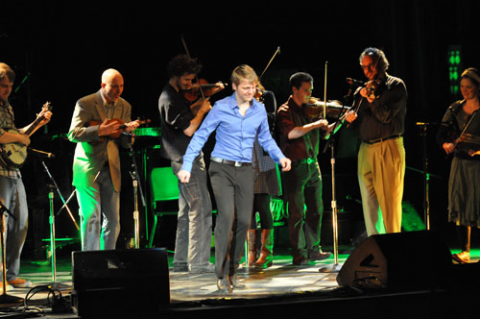
The Roots and Reasons concert explores roots music traditions and development, including bluegrass. Gospel, neo-soul, modern Turkish roots, and music from the Carribbean and South America were also on the bill.
Photo by Phil Farnsworth
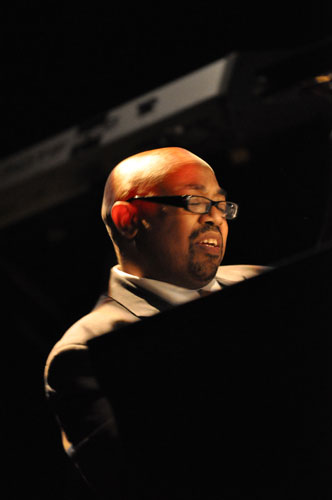
Harmony professor George Russell Jr. performs during the gospel portion of the concert.
Photo by Phil Farnsworth
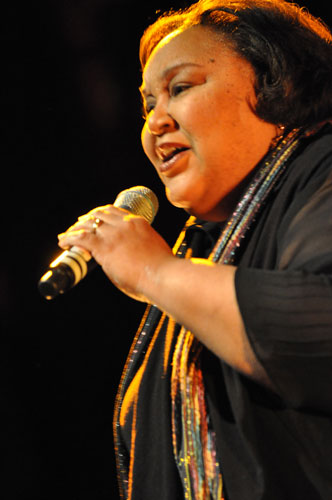
Voice professor Donna McElroy sings gospel.
Photo by Phil Farnsworth
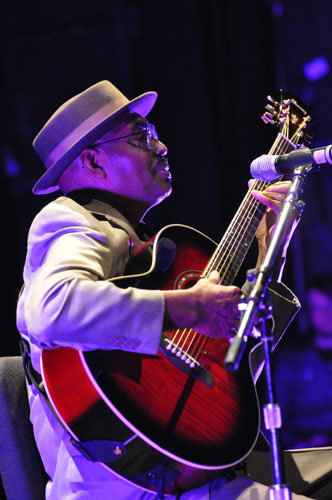
Special guest Ben Payton plays Delta blues.
Photo by Phil Farnsworth

In a neo-soul medley, student Courtney Knott sings.
Photo by Phil Farnsworth
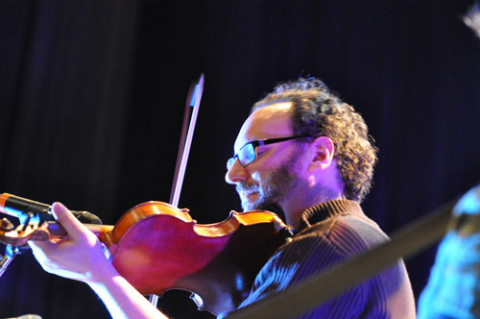
Songwriting professor Mark Simos plays fiddle as part of the Old-Time Fiddle portion of the concert.
Photo by Phil Farnsworth
Africana Studies, a focused area of study at Berklee, emphasizes the study of black music practices, history, and meaning, delving into the context behind the music. Each year, Africana Studies programming centers around a particular theme that ties together the principles of the discipline with performance. This year's theme, Roots and Reason, celebrates American roots music and the reasons behind it—spanning spirituals, blues, gospel, folk, country, bluegrass, and more, and tracing the origins and cross-connections of roots traditions, which have given birth to modern music. Director Bill Banfield, professor of Africana Studies/Music and Society, sat down to talk about Roots and Reason, music and culture, and incorporating musical influences. The following is a condensed and edited version of that conversation.
What does Roots and Reason mean in the context of Africana Studies?
We've tried to define Africana Studies by providing ways for students to see the connections and development of American popular music. Our programming and course development consists of the history and culture of this music; their impact on developing modernity; and the actual listening, performance, and discussion of those musical styles from the perspective and experience of recognized practitioners. We try to bring the world's best artists here, and each year these artists bring a thematic focus to a larger theme. It's very important for students to understand the roots of music. It doesn't come from MTV or BET or NBC. The roots of music come from people in communities who put music together, and it ultimately becomes part of these larger styles. Roots and Reason is an attempt to show those larger connections and to show how artists connect to those roots.
The term "reason" speaks to the context behind the music—the why. Can you talk about the circular notion that music informs culture and culture informs music?
The term roots music is something you can come at in two ways. When you think of American roots, you think of bluegrass, you think of blues, you think of Native American music. It can also extend to something you might not think of as roots, such as Turkish pop. You can get very layered and philosophical about this. You can look at roots spelled r-o-o-t-s or r-o-u-t-e-s, and talk about the connectedness of all of this and the reasons behind that.
To be completely culturally explicit, one school of thought is that all of American popular music derives itself from African American traditions. There are those who would hold that there would be no Berklee without Delta blues, Little Richard, or Mahalia Jackson. There is this idea that it all comes back to black American popular traditions, but more globally and honestly it goes to Africa. And if it goes to Africa, then it goes to the global world, because all these ideas were routes to each other as well as routes to the vernacular form from every country. But what connect these—besides coming from deeply entrenched traditions—are popular music traditions. And America was the continent, the culture, that produced this modern popular culture. Even if you're a kid in Israel or you're a young person in Turkey or Brazil, you're going to want to get funky a little bit, and you're going to look to Elvis, you're going to look to the blues, and you're going to look to jazz to help mechanize your vernacular form. In that way, each generation looks to American rock and roll and jazz to be popular. It's all a wonderful connection of roots that circle around and around.
Why is it so important—for Berklee musicians and the general audience—to know the roots?
This is an educational institution. It's our job to teach this. The fact that we are a leading institution in the world for American popular music underlines that role and responsibility. Fifteen or 20 years ago when I was coming up doing music, you were required to know the history and you were proud to know the history. Now there is another larger mega-cultural thing in place that has substituted that good old-fashioned idea of learning this. Technology allows you to bypass all that, go directly to the product, and skip the process. But in music and in arts, you really want people to have a skill set. In addition to what you sound like, one of the more important things is what you know from the inside. That's the education and the history—to know Muddy Waters, Mahalia Jackson, Chick Corea—so that you can learn the great lessons of the masters, and then create your own tradition. That kind of education is critical.
How does tapping into the roots make for a richer product?
It's not tangible, but it's evident when you look at the end result of the product. If you look at Beyoncé or a star basketball player, and you look at what they went through to get to where they are, the process becomes obvious. The same for a great painting, whereby a great painter has studied texture and color, emphasis on light. When you look at a great singer, performance, or band, you know the result of that is through hard work. That's what we want to do, that's our job, to encourage that kind of development that comes from hard work, experience, and culture. When you hear someone sing a song, you want it to sound like the person knows what he or she is talking about, that they want to convey an inspiring message or illuminate a certain cause or lift my soul a certain way. That's what we expect artists to do.
How does the process of incorporating musical influences figure into the ideas of roots and reason?
Musicians can take a piece of an artist and make it their own. An artist's sensibility is you listen to Kenny G and you like him, then you go back and listen to John Coltrane and you like him, and then maybe listen to some India.Arie and then some great vocalists you like, such as Bonnie Raitt and you say, "Wow." A young artist is supposed to combine all those things with life and experience and make a new thing. In that way, these are routes to the root.